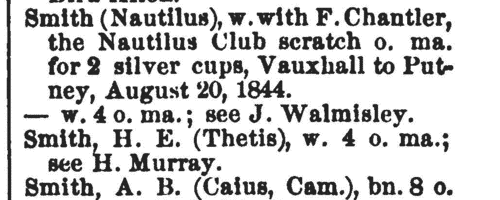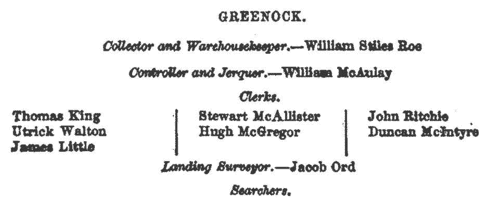Musgrove Surname Ancestry ResultsOur indexes 1000-1999 include entries for the spelling 'musgrove'. In the period you have requested, we have the following 234 records (displaying 131 to 140): Single Surname Subscription | | | Buying all 234 results of this search individually would cost £1,366.00. But you can have free access to all 234 records for a year, to view, to save and print, for £100. Save £1,266.00. More... |
These sample scans are from the original record. You will get scans of the full pages or articles where the surname you searched for has been found. Your web browser may prevent the sample windows from opening; in this case please change your browser settings to allow pop-up windows from this site. Gentlemen amateur rowers
(1835-1851)
Rowing was one of the English sports covered in detail in the pages of Bell's Life in London, and from these was compiled a compendium called the Aquatic Oracle. The text is divided into two main parts: Gentlemen Amateurs and Watermen. All the entries are cross-referenced, and use these abbreviations: w., won; l., lost; b., beat; bn., beaten; sc. ma., scullers' match; o. ma., oars match; do. sc. ma., double scullers' match; 4 o.ma., 4 oars match; 8 o. ma., 8 oars match; sk., stroke; cox., coxswain; as., a side; Oxon., Oxonian; V. to P., Vauxhall to Putney; W. to P., Westminster to Putney; P. to M., Putney to Mortlake; M. to P., Mortlake to Putney; dis., distance.MUSGROVE. Cost: £6.00.  | Sample scan, click to enlarge

| Deaths, Marriages, News and Promotions
(1851)
Death notices and obituaries, marriage and birth notices, civil and military promotions, clerical preferments and domestic occurrences, as reported in the Gentleman's Magazine. Mostly from England and Wales, but items from Ireland, Scotland and abroad. July to December 1851
MUSGROVE. Cost: £4.00.  | Sample scan, click to enlarge

|  Residents of Upper Crown Street, Westminster
(1851) Residents of Upper Crown Street, Westminster
(1851)
In the 1851 census, Westminster superintendent registrar's district, St Margaret's registrar's district, enumeration district 3 comprised part of St Margaret's parish and St Margaret's ecclesiastical district in the city of Westminster. HO 107/1480
MUSGROVE. Cost: £2.00.  | Sample scan, click to enlarge

| Traders and professionals in London
(1851)
The Post Office London Directory for 1851 includes this 'Commercial and Professional Directory', recording about 80,000 individuals. MUSGROVE. Cost: £4.00.  | Sample scan, click to enlarge

| Traders in Greenwich, Woolwich &c.
(1852)
W. Archdeacon's Greenwich and Woolwich Directory for 1852 (including Deptford, Blackheath, Lewisham, Charlton, Plumstead, Shooter's Hill, Lee,&c.) has two long alphabetical listings, commercial and private residents.
MUSGROVE. Cost: £4.00.  | Sample scan, click to enlarge

| Customs Officers at Liverpool
(1853)
The lists of customs officers at the outports of Great Britain and Ireland give the full names of the staff arranged by rank - usually the collector, controller, clerks, landing surveyors, searchers, superintendent of lockers, chief tide surveyor and inspector of water guard, tide surveyors, inspectors of patrol, and inspecting commander of coast guard. The jurisdiction of this port included the creek of Runcorn.MUSGROVE. Cost: £6.00.  | Sample scan, click to enlarge

|  Marines on H. M. S. Britannia in the Crimean War
(1854-1856) Marines on H. M. S. Britannia in the Crimean War
(1854-1856)
Sebastopol in the Crimea was the great Russian naval arsenal on the Black Sea. A combined assault by British, French and Turkish troops resulted in the reduction of Sebastopol and led to the Treaty of Paris of 27 April 1856, guaranteeing the independence of the Ottoman Empire. By Admiralty Order the Crimea Medal was awarded to sailors and marines present during the campaign, between 17 September 1854 (the first landing at Eupatoria) and 9 September 1855 (when the allies secured Sebastopol). This is the list of officers and men of the Marine Brigade borne by this ship and awarded the Crimea Medal. Her Majesty's Ship Britannia, a 120-gun sailing ship, took part in the assault. Four clasps to this medal were awarded to the men present in the actions at Sebastopol itself (September 1854 to September 1855), Inkerman (5 November 1854), Balaklave (Balaclava) (25 October 1854) and (the sea of) Azoff. In this list the column headed 'No. on Ship's Book' has been used to show for each man entitlement to the clasps for B(alaclava), I(nkerman) and/or S(ebastopol).MUSGROVE. Cost: £8.00.  | Sample scan, click to enlarge

|  Sailors and marines on H. M. S. Arethusa in the Crimean War
(1854-1856) Sailors and marines on H. M. S. Arethusa in the Crimean War
(1854-1856)
Sebastopol in the Crimea was the great Russian naval arsenal on the Black Sea. A combined assault by British, French and Turkish troops resulted in the reduction of Sebastopol and led to the Treaty of Paris of 27 April 1856, guaranteeing the independence of the Ottoman Empire. By Admiralty Order the Crimea Medal was awarded to sailors and marines present during the campaign, between 17 September 1854 (the first landing at Eupatoria) and 9 September 1855 (when the allies secured Sebastopol). The sailors' medals were mostly delivered to them on board ship in the course of 1856; the marines' medals were sent to their respective headquarters for distribution. The remarks as to distribution in this medal roll therefore give more specific information as to the whereabouts of the sailor recipients in 1856 than about the marines. Her Majesty's Ship Arethusa, a 50-gun sailing ship, took part in the assault. Four clasps to this medal were awarded to the men present in the actions at Sebastopol itself, Inkerman, Balaklave (Balaclava) and (the sea of) Azoff, but the recipients of these clasps are recorded on separate rolls, not part of this index, but indexed on this site.MUSGROVE. Cost: £8.00.  | Sample scan, click to enlarge

|  Sailors and marines on H. M. S. Britannia in the Crimean War
(1854-1856) Sailors and marines on H. M. S. Britannia in the Crimean War
(1854-1856)
Sebastopol in the Crimea was the great Russian naval arsenal on the Black Sea. A combined assault by British, French and Turkish troops resulted in the reduction of Sebastopol and led to the Treaty of Paris of 27 April 1856, guaranteeing the independence of the Ottoman Empire. By Admiralty Order the Crimea Medal was awarded to sailors and marines present during the campaign, between 17 September 1854 (the first landing at Eupatoria) and 9 September 1855 (when the allies secured Sebastopol). The sailors' medals were mostly delivered to them on board ship in the course of 1856; the marines' medals were sent to their respective headquarters for distribution. The remarks as to distribution in this medal roll therefore give more specific information as to the whereabouts of the sailor recipients in 1856 than about the marines. Her Majesty's Ship Britannia, a 120-gun sailing ship, took part in the assault. Four clasps to this medal were awarded to the men present in the actions at Sebastopol itself, Inkerman, Balaklave (Balaclava) and (the sea of) Azoff, but the recipients of these clasps are recorded on separate rolls, not part of this index, but indexed on this site.MUSGROVE. Cost: £8.00.  | Sample scan, click to enlarge

|  Sailors and marines on H. M. S. Royal Albert in the Crimean War
(1854-1856) Sailors and marines on H. M. S. Royal Albert in the Crimean War
(1854-1856)
Sebastopol in the Crimea was the great Russian naval arsenal on the Black Sea. A combined assault by British, French and Turkish troops resulted in the reduction of Sebastopol and led to the Treaty of Paris of 27 April 1856, guaranteeing the independence of the Ottoman Empire. By Admiralty Order the Crimea Medal was awarded to sailors and marines present during the campaign, between 17 September 1854 (the first landing at Eupatoria) and 9 September 1855 (when the allies secured Sebastopol). The sailors' medals were mostly delivered to them on board ship in the course of 1856; the marines' medals were sent to their respective headquarters for distribution. The remarks as to distribution in this medal roll therefore give more specific information as to the whereabouts of the sailor recipients in 1856 than about the marines. Her Majesty's Ship Royal Albert, a 120-gun screw steamer, took part in the assault. Four clasps to this medal were awarded to the men present in the actions at Sebastopol itself, Inkerman, Balaklave (Balaclava) and (the sea of) Azoff, but the recipients of these clasps are recorded on separate rolls, not part of this index, but indexed on this site. This index also covers the Royal Albert's two tenders, the Clinker and the Grinder.MUSGROVE. Cost: £8.00.  | Sample scan, click to enlarge

|
Research your ancestry, family history, genealogy and one-name study by direct access to original records and archives indexed by surname.
|













